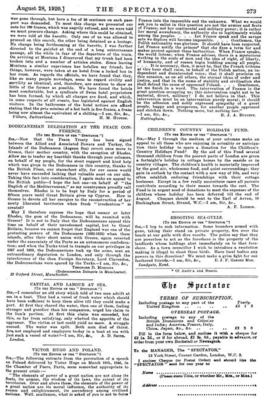VICTOR HUGO AND POLAND.
[To THE EDITOR OF THE " SPECTATOR."] Sia,—The following extracts from the peroration of a speech on Poland delivered by Victor Hugo on March 19th, 1846, in the Chamber of Peers, Paris, seem somewhat appropriate to the present crisis :- " The elements of power of a great nation are not alone its fleets, its armies, the wisdom of its laws, the extent of its territories. Over and above these, the elements of the power of a great nation are its moral influence, the authority of its reason and enlightenment, its ascendency among civilized nations. Well. gentlemen, what is asked of you is not to force France into the impossible and the unknown. What we would ask you to enlist in this question are not the armies and fleets of France; not her continental and military power; it is rather her moral ascendancy, the authority she so legitimately wields among the peoples. . . . Let France speak and the savage acts we deplore will become impossible. . . . Gentlemen, the Polish nationality was glorious. It should have been respected. Let France notify the princes• that she fixes a term for and makes protest against these barbarities. When France speaks, the world listens; when France advises, there is a mysterious working in the souls of men and the idea of right, of liberty, of humanity, and of reason begin budding among all people. . . . It is necessary, then, it must be, That the French tribune at this hour shall raise, in behalf of the Polish nation, an in- dependent and disinterested voice; that it shall proclaim on this occasion, as on all others, the eternal ideas of order and justice, and that in the name of stability and civilization she shall defend the cause of oppressed Poland. . . . Gentlemen, let me finish in a word. The intervention of France is the great question occupying us; this intervention ought not to be material, direct, military! I do not believe in that. This intervention must be an intervention purely moral; it should be the adhesion and nobly expressed sympathy of a great people, happy and prosperous, for another people oppressed and stricken down. Nothing more, but nothing less."


































 Previous page
Previous page